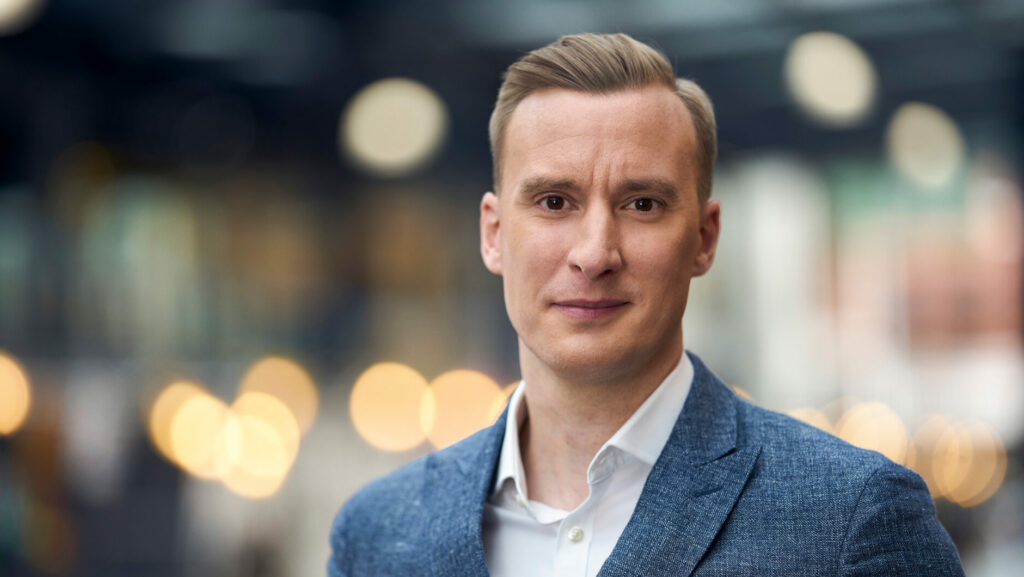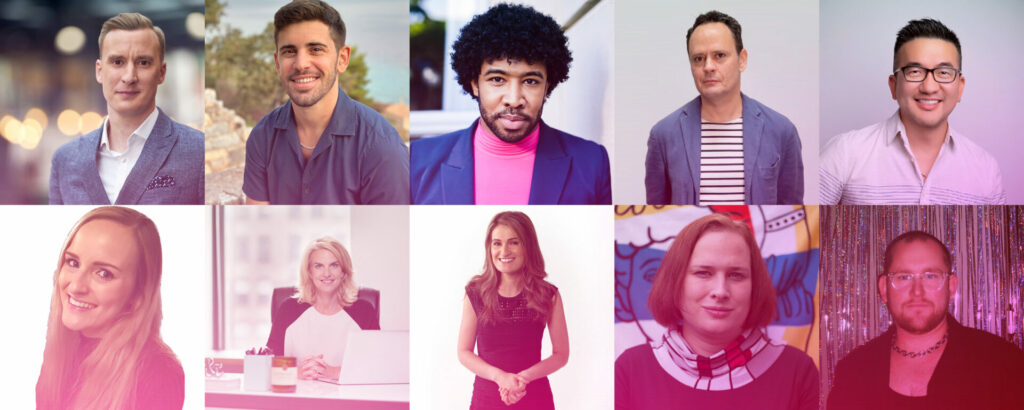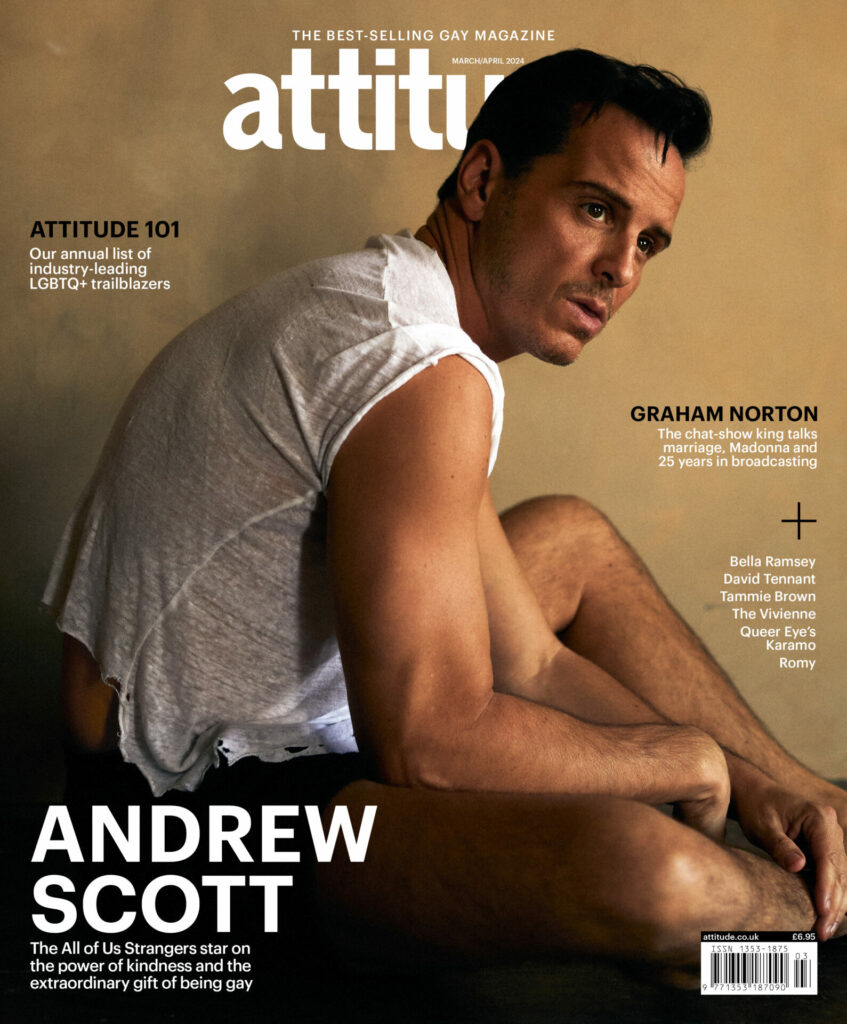ITV News UK Editor Paul Brand on juggling family life with a 24/7 news cycle
Exclusive: From Vote Leave to Partygate, this Welsh-English journalist has helped break some of the biggest stories in recent memory. Here, the UK editor of ITV News talks juggling family life alongside a 24-hour news cycle

Politics has been Paul Brand’s singular professional obsession since he was 17. “I was watching the Iraq war play out on television and was fascinated by the politics of it,” the Oxford graduate recalls. But Paul – leader of the media and broadcast category of this year’s Attitude 101, empowered by Bentley – had no desire to become a politician. “Political journalism was the draw. So, I did a politics degree, and trained to be a journalist.”
After working for ITV Wales, ITV Yorkshire and ITV Tyne Tees & Border, he covered politics for Good Morning Britain and joined ITV News in 2016. In 2021, the year he was made UK editor of ITV News, he and his team broke the Partygate story, broadcasting a video of No 10 Press Secretary Allegra Stratton joking about a No 10 party that broke Covid-19 lockdown rules. It later emerged that then-Prime Minister Boris Johnson had attended a number of these parties, with Brand obtaining pictures as proof — a scandal that contributed to the Conservative stepping down as both PM and MP. Partygate remains one of the proudest moments of Brand’s career.
“The whole country felt betrayed by what happened,” he remembers. “Being able to see people held to account for their mistakes, for the general public to feel as though they got some justice was really satisfying.”
The 38-year-old rarely works too far ahead, but this year is different. “From now onwards, we’re heavily focused on the general election,” he explains. “This is the first time since 2015 we’ve had a long build-up to an election,” he adds. One way to prepare for such a key year in political history is “predict the unpredictable. There have been such seismic shocks. The working assumption, looking at the polling, is Labour are likely to win, but things could obviously change.”
Here, Brand reflects on investigating everything from discrimination in the Fire Service to so-called LGBTQ+ ‘conversion therapy’.
What’s the pressure like when you’re in the middle of big stories?
There’s huge pressure to get the story right because you know it has massive political ramifications. You don’t want to make a mistake or be inaccurate. There’s a huge amount of checking, legal verification. There’s public pressure. There are some people who feel Boris Johnson was unfairly removed as PM, a lot of which is associated with Partygate. There was a lot of abuse on social media from some quarters.
You’ve received homophobic abuse. How regularly does that happen?
It’s not overwhelming. Like all forms of discrimination, it’s often hidden as a sub-context to something else. With Partygate, there were people angry we were reporting so much on parties at No 10. They’d start by arguing ITV were too focused on it, and it would turn to homophobic undertones about me personally. I knew this job came with a level of exposure, that there would be people wanting to hold me to account as a journalist. I respect that. What’s harder is when they attack my family. My journalism is not their responsibility. That’s the stuff that tends to get in my head more.
What’s your advice to young LGBTQ+s considering a journalism career?
The industry is massively evolving. It’s an exciting place now. Your difference is your strength. Look at the power of the more niche media we have — people specialising in certain areas who are able to get a massive audience on social media. Having expertise in an area, or having something different about you as a journalist, is a strength. You were expected to fit into a mould 20 years ago in media. Certainly, at the outset of my career, I was encouraged to play down my sexuality. It was a macho environment where only one type of journalist succeeded: male, white and straight. Aggressive. These days, the industry has transformed. ITV News is certainly absolutely welcoming in terms of diversity.
How do you balance work and parenthood?
With difficulty. My son’s the absolute joy of my life. […] But because my job’s unpredictable and I have to follow news, I don’t always know what time I’m going to be home. I’m lucky I have such a supportive husband who has an amazing career of his own, but his job is more predictable, so he’s able to help me out when I’m having a crazy period. And another way newsrooms have changed is they’re more family friendly.
How do you switch off?
You have to take time out from the news to stay healthy. I get told off in my family for not putting my phone down. My son’s growing up quickly. If I’m looking at my phone and not him, I’m missing out on his childhood. The past years have been insane, with the pandemic, Brexit, war in Europe, now war in the Middle East. The way I switch off, genuinely, is spending time with my son.
Where do you see yourself in the future?
I love broadcasting. It’s where my heart is. I see myself doing the same kind of thing in five to 10 years.
What stories are you proudest of?
Those where the people at the heart of the story had their lives transformed. Whether that’s reporting on ‘conversion therapy’, when people have been really adversely affected by that practice and want to see a ban happen, or whether it’s an investigation we did recently into racism, misogyny and homophobia in the Fire Service. Some of the people at the heart of that story finally have justice. Partygate I’d put in that bracket.
[Also] important was the documentary we did about trying to find the first person in Britain who died of AIDS — not from a stigmatising point of view [Searching for Patient Zero: Britain’s AIDS Tragedy]. My producer Nathan [Lee], a straight man and an amazing ally to the LGBT community and the reporting we’ve done, was actually the one who found patient zero.
This person, John Eaddie, had been so heavily stigmatised when he died. We spent days talking about the first Covid patients, but these people who first got AIDS were buried away. We wanted to pay tribute. I knew how important that story was for many in the LGBT community, how important a piece of history it was.
This feature appears in issue 357 of Attitude magazine, available to order online here, and alongside 15 years of back issues on the free Attitude app
Attitude 101, empowered by Bentley is our list of the year’s 101 most influential LGBTQ+ people.

The 10 categories, each featuring 10 individuals, are Media & Broadcast, Film, TV, and Music supported by LA Tourism, Science, Technology, Engineering, & Mathematics (STEM), Third Sector & Community, Financial & Legal, Fashion, Art & Design, Sport, Travel, Business, and The Future supported by Clifford Chance.
The full Media and Broadcast list of Attitude 101, empowered by Bentley

Paul Brand – Journalist
Enrique Anarte – Journalist, Openly
Eugene Daniels – Journalist, POLITICO
Sarah Kate Ellis – President and CEO of GLAAD
Sian Elvin – Journalist, the Independent
Hugo Greenhalgh – Journalist, Openly
Juliet Jacques – Writer, filmmaker, broadcaster and academic
Patricia Karvelas – TV and radio host, ABC Australia
Jay Lin – CEO, Portico Media
Josh Parry – Producer and reporter, BBC News
This feature appears in issue 357 of Attitude magazine, available to order online here, and alongside 15 years of back issues on the free Attitude app.

